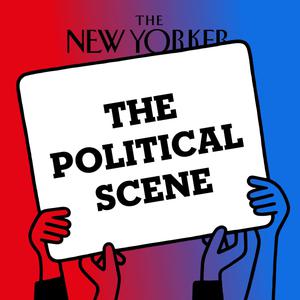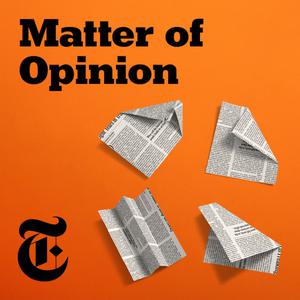
The Political Scene | The New Yorker
WNYC Studios and The New Yorker
The Political Scene | The New Yorker
- 39 minutes 44 secondsCould Kamala Harris Be a Trump-Level Cultural Phenomenon?
The Washington Roundtable: Susan B. Glasser, Jane Mayer, and Evan Osnos discuss the start of Kamala Harris’s Presidential campaign and the surge of excitement among Democrats on the Internet and at rallies. Plus, who might be her running mate and how Republicans plan to launch “racist, misogynist” attacks against her.
This week’s reading:
- “Biden’s Exit, Harris’s Moment,” by Susan B. Glasser
- “Why Did Progressive Democrats Support Joe Biden?,” by Keeanga-Yamahtta Taylor
- “Kamala Harris Should Tell Her Family’s Story,” by Jay Caspian Kang
- “J. D. Vance’s Sad, Strange Politics of Family,” by Jessica Winter
- “Was Biden’s Decision to Withdraw ‘Heroic’?” by Isaac Chotiner
- “Kamala Harris, the Candidate,” by Doreen St. Félix
- “Who Should Kamala Harris Pick as Her Running Mate?” by Amy Davidson Sorkin
- “J. D. Vance’s Radical Religion,” by Paul Elie
To discover more podcasts from The New Yorker, visit newyorker.com/podcasts. To send in feedback on this episode, write to [email protected] with “The Political Scene” in the subject line.26 July 2024, 1:35 pm - 51 minutes 28 secondsThe “Strange Charisma” of Kamala Harris
The New Yorker staff writers and cultural critics Doreen St. Félix and Vinson Cunningham join Tyler Foggatt to discuss Kamala Harris’s sudden ascendence to the top of the Democratic ticket. How might her gender, race, and long political career from prosecutor to Vice-President shape the campaign ahead? “In a weird way, I think that she can run against both Trump and, implicitly, very subtly, against Biden, too,” Cunningham says. “I think her strongest way to code herself is: we're finally turning the page.”
This week’s reading:
- “Kamala Harris, the Candidate,” by Doreen St. Félix
- “A Mood of Optimism at Kamala Harris’s First Campaign Stop,” by Emily Witt
- “Who Should Kamala Harris Pick as Her Running Mate?,” by Amy Davidson Sorkin
To discover more podcasts from The New Yorker, visit newyorker.com/podcasts. To send feedback on this episode, write to [email protected].25 July 2024, 4:50 am - 39 minutes 23 secondsSpecial Episode: Biden Passes the Torch
The Washington Roundtable: Susan B. Glasser, Jane Mayer, and Evan Osnos discuss President Biden’s stunning exit from the 2024 Presidential election and his endorsement for Vice-President Kamala Harris to lead the Democratic ticket. How could this new matchup change the terms of the race, now that Biden’s age is no longer a key issue?
This week’s reading:
- “Joe Biden’s Act of Selflessness,” by Evan Osnos
- “Joe Biden Leaves the Stage,” by Adam Gopnik
- “Where Do Republicans and Democrats Stand After the R.N.C.?” by Benjamin Wallace-Wells
- “The Spectacle of Donald Trump’s R.N.C.,” by Antonia Hitchens, photography by Sinna Nasseri
To discover more podcasts from The New Yorker, visit newyorker.com/podcasts. To send in feedback on this episode, write to [email protected] with “The Political Scene” in the subject line.
23 July 2024, 12:43 am - 36 minutes 25 secondsTrump’s Triumphant R.N.C. and Biden’s Dilemma
The Washington Roundtable: Susan B. Glasser, Jane Mayer, and Evan Osnos discuss takeaways from the Republican National Convention, which Glasser reports had the feeling of “a very polite Midwestern cult meeting.” Plus, Donald Trump's selection of J. D. Vance as his running mate and the mounting pressure for President Biden to drop out of the race.
This week’s reading:
- “Donald Trump’s Second Coming,” by Susan B. Glasser
- “Doctors Are Increasingly Worried About Biden,” by Dhruv Khullar
- “The Rise of the New Right at the Republican National Convention,” by Benjamin Wallace-Wells
- “Are We Already Moving On from the Assassination Attempt on Trump?” by Jay Caspian Kang
- “The Paralysis of the Democratic Party,” by Isaac Chotiner
- “Why Donald Trump Picked J. D. Vance for Vice-President,” by Benjamin Wallace-Wells
- “Bernie Sanders Wants Joe Biden to Stay in the Race,” by Isaac Chotiner
- “Trump, Unity, and MAGA Miracles at the R.N.C.,” by Antonia Hitchens
To discover more podcasts from The New Yorker, visit newyorker.com/podcasts. To send in feedback on this episode, write to [email protected] with “The Political Scene” in the subject line.20 July 2024, 1:50 am - 23 minutes 20 secondsA Dispatch from the Republican National Convention
The New Yorker contributing writer Antonia Hitchens calls Tyler Foggatt from Milwaukee to offer some details and observations from the first night of the Republican National Convention, at which Donald Trump was formally nominated to be the G.O.P.’s 2024 Presidential nominee. An assassination attempt on the former President over the weekend only heightened the messianic feeling that surrounds Trump, and gave a strange poignancy to the anointing of J. D. Vance as Trump’s running mate and the potential next leader of the MAGA movement, Hitchens says.
This week’s reading:
- “Trump, Unity, and MAGA Miracles at the R.N.C.,” by Antonia Hitchens
- “A Nation Inflamed,” by David Remnick
- “Why Donald Trump Picked J. D. Vance for Vice-President,” by Benjamin Wallace-Wells
To discover more podcasts from The New Yorker, visit newyorker.com/podcasts. To send feedback on this episode, write to [email protected].
17 July 2024, 10:35 pm - 27 minutes 13 secondsJulián Castro on the Biden Problem, and What the Democratic Party Got Wrong
The panic that gripped Democrats during and after President Biden’s performance in the June debate against Donald Trump didn’t come out of nowhere. In January of last year, the Radio Hour produced an episode about President Biden’s age, and the concerns that voters were already expressing. But no nationally prominent Democratic politician was willing to challenge Biden in the primaries. After the debate, Julián Castro was one of the first prominent Democrats to say that Biden should withdraw from the race, and he went on to tell MSNBC’s Alex Wagner that potential Democratic rivals and even staffers “got the message” that their careers would be “blackballed” if they challenged him. Castro—who came up as the mayor of San Antonio, and then served as President Obama’s Secretary for Housing and Urban Development—ran against Biden in the Presidential primary for the 2020 election. He talks with David Remnick about how we got here, and what the Democratic Party should have done differently.
15 July 2024, 10:00 am - 42 minutes 37 secondsThe Great Democratic Party Freakout of 2024
The Washington Roundtable: Susan B. Glasser, Jane Mayer, and Evan Osnos discuss President Joe Biden’s struggle to retain voters’ confidence in his bid for reëlection and his animosity toward the “élites” he says are insisting that he step down. Plus, Donald Trump’s campaign strategy amid Democratic turmoil and ahead of the Republican National Convention in Milwaukee.
“The problem is the meta-narrative, which seems to be centered on: Will Biden faceplant or won’t he?,” Jane Mayer says. “And, so long as that’s the narrative, the narrative is not on Donald Trump and the threat to democracy that he poses.”
This week’s reading:
- “Joe Biden’s Less-Than-Awful Press Conference Does Not Mean Everything Is Now O.K.,” by Susan B. Glasser
- “The Controlled Normalcy of Kamala Harris’s Trip to Las Vegas,” by Antonia Hitchens
- “A Congressional Democrat Explains Why He’s Standing with Biden,” by Isaac Chotiner
- “Joe Biden’s Cynical Turn Against the Press,” by Jay Caspian Kang
- “Joe Biden Is Fighting Back—but Not Against Trump, Really,” by Benjamin Wallace-Wells
To discover more podcasts from The New Yorker, visit newyorker.com/podcasts. To send in feedback on this episode, write to [email protected] with “The Political Scene” in the subject line.
13 July 2024, 2:07 am - 37 minutes 16 secondsThe Case for Using the Twenty-fifth Amendment on Biden
The New Yorker contributor and Harvard Law professor Jeannie Suk Gersen joins Tyler Foggatt to discuss a once obscure constitutional provision that allows Cabinet members to remove an unfit President from office. Gersen believes it’s time to use it on Biden. “The Twenty-fifth amendment was designed for a situation in which the President may not recognize his own impairment,” she says.
This week’s reading:
- “This Is What the Twenty-fifth Amendment Was Designed For,” by Jeannie Suk Gersen
- “The Reckoning of Joe Biden,” by David Remnick
- “Joe Biden Is Fighting Back—but Not Against Trump, Really,” by Benjamin Wallace-Wells
To discover more podcasts from The New Yorker, visit newyorker.com/podcasts. To send feedback on this episode, write to [email protected].
10 July 2024, 10:12 pm - 18 minutes 37 secondsJohn Fetterman’s Move to the Right on Israel
Many Democrats saw John Fetterman as a progressive beacon: a Rust Belt Bernie Sanders who—with his shaved head, his hoodie, and the Zip Code of Braddock, Pennsylvania—could rally working-class white voters to the Democratic Party. But at least on one issue, Fetterman is veering away from the left of his party, and even from centrists like Majority Leader Chuck Schumer: Israel’s war in Gaza. Fetterman has taken a line that is not just sympathetic to Israel after the October 7th attack by Hamas; he seems to justify the civilian death toll Israel has inflicted on Gaza. “When you have that kind of an evil, or that kind of a movement that came out of a society,” he told Benjamin Wallace-Wells, “whether it was Nazi Germany or imperial Japan or the Confederacy here in the South, that kind of movement has to be destroyed. . . . that’s why Atlanta had to burn.” Wallace-Wells shares excerpts from his interviews with Fetterman in a conversation with David Remnick, and they discuss how Fetterman’s support for Israel is driving a wedge among Pennsylvania voters, who will be critical to the outcome of the Presidential election.
8 July 2024, 10:00 am - 30 minutes 45 secondsFrom “Inside the Hive”: How Steve Bannon’s Prison Sentence Could Help Trump Win
With the New Yorker office closed for the July 4th holiday, The Political Scene brings you a recent episode from Vanity Fair’s “Inside the Hive,” hosted by the special correspondent Brian Stelter. Tina Nguyen, a national correspondent for Puck, and the Washington Post’s Isaac Arnsdorf, a national political reporter, join Stelter to discuss how Steve Bannon helped rehabilitate Donald Trump among Republicans after January 6th. Bannon’s popular “War Room” podcast has been galvanizing the far right at the local and national level, and his four-month prison sentence for contempt of Congress could actually burnish his bona fides with the base. “It’s amazing clout,” Nyugen says of Bannon’s prison sentence, “for someone in the MAGA world, in these MAGA times, with a MAGA audience.”
This episode originally aired on June 20th, 2024.
To discover more from “Inside the Hive” and other Vanity Fair podcasts, visit vanityfair.com/podcasts.3 July 2024, 9:00 am - 23 minutes 28 secondsThe New Yorker’s Political Writers Answer Your Election Questions
At the beginning of 2021, it seemed like America might be turning a new page; instead, the election of 2024 feels like a strange dream that we can’t wake up from. Recently, David Remnick asked listeners what’s still confounding and confusing about this Presidential election. Dozens of listeners wrote in from all over the country, and a crack team of political writers at The New Yorker came together to shed some light on those questions: Susan B. Glasser, Jill Lepore, Clare Malone, Andrew Marantz, Evan Osnos, Kelefa Sanneh, and Benjamin Wallace-Wells.
1 July 2024, 10:00 am - More Episodes? Get the App
Your feedback is valuable to us. Should you encounter any bugs, glitches, lack of functionality or other problems, please email us on [email protected] or join Moon.FM Telegram Group where you can talk directly to the dev team who are happy to answer any queries.
 The New Yorker Radio Hour
The New Yorker Radio Hour
 Radio Atlantic
Radio Atlantic
 Matter of Opinion
Matter of Opinion
 The Ezra Klein Show
The Ezra Klein Show
 Political Gabfest
Political Gabfest
 Amicus With Dahlia Lithwick | Law, justice, and the courts
Amicus With Dahlia Lithwick | Law, justice, and the courts